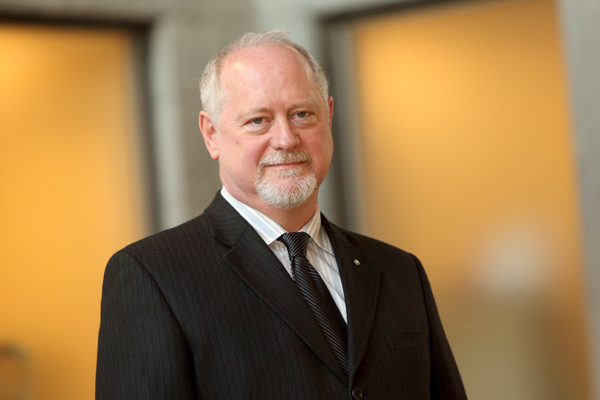
Source: McGill Reporter
On Tuesday, December 12, 2018, McGill’s Board of Governors approved the reappointment of Dr. Guy Rouleau as Director of the Montreal Neurological Institute (MNI). Dr. Rouleau’s second five-year term will begin on January 1, 2018, and end on December 31, 2022.
The reappointment came on the recommendation of an Advisory Committee led by Provost Christopher Manfredi (Chair) and Dr. David Eidelman (Vice-Chair), Vice-Principal (Health Affairs) and Dean of the Faculty of Medicine.
In a message to the McGill community, Principal Suzanne Fortier noted that the Advisory Committee was particularly impressed by MNI’s “increased research visibility and strong clinical contributions made under the leadership of Dr. Rouleau, by the quality of Dr. Rouleau’s own research, and by his fiscal management.”
Principal Fortier also highlighted “the high quality of recent recruitments, and the institute’s success in attracting new philanthropic funding.” Under Dr. Rouleau’s leadership, the MNI has hired 15 new principal investigators; the MNI’s 70-plus research faculty is an all-time high. In 2016, the MNI became the first academic institute worldwide to fully embrace Open Science, with the creation of the Tanenbaum Open Science Institute, a bold initiative to accelerate the discovery of leading-edge therapeutics by sharing neuroscience findings and data worldwide.
Guy Rouleau came to the MNI in 2013 from the Université de Montréal, where, in addition to his own research laboratory, he directed the Ste-Justine Hospital Research Centre, the Centre of Excellence in Neuroscience of the Université de Montréal (CENUM) and the Réseau de médecine génétique appliquée du Québec – FRQS. An MD graduate from the University of Ottawa, Rouleau completed his PhD in genetics at Harvard University and did post-graduate work at both the MNI and Massachusetts General Hospital.
The highlights of Dr. Rouleau’s distinguished research and clinical care career include contributing to the identification of more than 20 disease-causing genes and his discovery of new mutational mechanisms. Over the last 20 years, Dr. Rouleau and his team have focused on identifying genes causing such neurological and psychiatric diseases as autism, amyotrophic lateral sclerosis (ALS), hereditary neuropathies, epilepsy and schizophrenia, as well as providing a better understanding of the molecular mechanisms that lead to these disease symptoms. He has contributed to some 600 scientific papers and sits on the editorial boards of major scientific journals. He also serves on the IGBMC Strategic Scientific Advisory Board (Strasbourg, France), among other international scientific boards, and is a board member of several foundations and societies that aim to find cures for nervous system diseases.
During his first term as Director of the MNI, he received the Prix de l’oeuvre scientifique (2016) from the Médecins francophones du Canada and the Prix d’Excellence du Collège des Médecins du Québec (2014), and was made a fellow of the Royal Society of Canada (2016). In 2012, Dr. Rouleau was given Quebec’s highest honour for scientific achievement, the Prix du Québec-Prix Wilder Penfield. He has also received the Margolese National Brain Disorders Prize from the University of British Columbia, and the Henry Friesen Prize from the Royal College of Physicians and Surgeons of Canada/The Canadian Society for Clinical Investigation. He is an Officer of the Ordre national du Québec.
Founded in 1934, the MNI mission is to conduct cutting-edge neuroscience research and to provide the highest levels of advanced and compassionate care for patients with neurological conditions.
December 15, 2017
